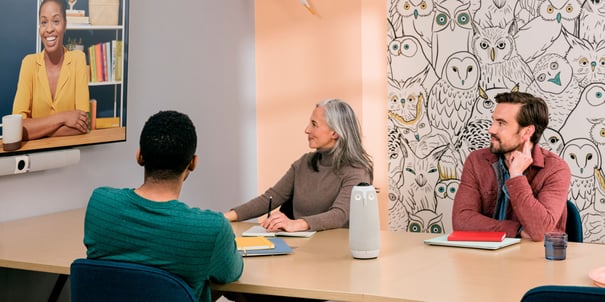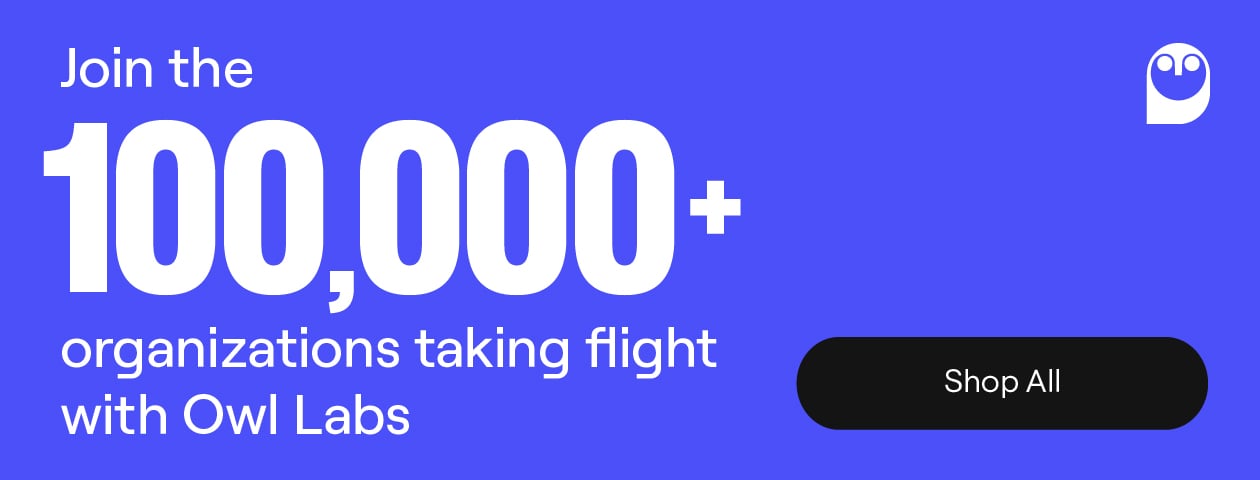With the rise of remote and hybrid work, hosting effective and productive smart meetings is more critical than ever. Smart meetings use smart meeting rooms, which have innovative conference room technology like smart video conference cameras, software, and collaboration tools that make it easier for people to work from places other than the office. This technology comes together to create a new, future-focused space called a smart meeting room.
A smart meeting room is a space that integrates hardware and software in the meeting room itself to create an incredibly productive meeting experience for participants, whether they're joining the meeting from the office or remotely.
Business leaders, office managers, and IT professionals can analyze the way meeting tools and spaces are used to ensure that smart meeting rooms are effective for all employees. In this post, we'll cover the things you need to know about smart meeting rooms and the elements that make them smart.
What is a smart meeting room?
A smart meeting room is a key element of a smart office setup. Smart meeting rooms are outfitted with a mix of hardware and software technology that optimizes the space for hybrid collaboration. The final result is a meeting room that can facilitate meaningful conversations between attendees, no matter where they are.
Through a smart meeting room solution, IT leaders can analyze aspects of the meeting space (e.g., how the tools are used, how often meetings are held, and which rooms are used most frequently) and use data to ensure that smart meeting rooms are being utilized to their fullest potential. Smart meeting rooms allow employees to get together, collaborate synchronously, and work together productively, no matter where they're located.
So, what does it take to make a smart meeting room, smart? Here are a few key elements that make a smart meeting room ecosystem work.
Smart meeting room features
1. Video conferencing software
Video conferencing software is an essential aspect of any meeting room, especially a smart meeting room. Conference room technology also includes smart cameras, whiteboards, and analytics tools that help optimize the meeting experience for all attendees. It allows for seamless communication with your distributed workforce and makes it easy to schedule, invite others, and start a video conference with your team. In fact, video conferencing software is integral to the success of any modern organization and should be utilized by all employees, even when they can’t be in an official meeting space.
Below are some popular video conferencing software options, many of which offer free versions of their software.
Smart meeting room video conferencing software:
2. Smart video conference camera
Many meeting spaces and conference rooms are outfitted with a video conference camera that allows distributed and hybrid teams to meet together in real time. These cameras connect to computers, monitors, and in-room devices to display a live video feed of the meeting. But a simple web camera doesn’t cut it anymore. These are the latest smart meeting room solutions that every modern smart meeting room needs.
Smart conference table technology
A single camera is only able to cover a specific field of view and requires in-person attendees to look at the camera instead of the screen if they want to give their remote counterparts a chance at face-to-face communication. That’s why the best smart meeting rooms don’t just invest in technology for the front of the room, they also embrace front-and-center solutions by investing in smart conference table solutions.
The Meeting Owl 3 and Owl Bar are the perfect solutions for any front-and-center space.These devices are part of modern conference room design and are key to creating smart meetings, as they allow for a more inclusive and engaging experience for all participants, regardless of their location. The Owl Bar sits in the front of a meeting room, usually under a large screen. The Meeting Owl 3 sits in the center of the conference room table, providing 360-degree video coverage. Together, these devices cover every angle, and automatically highlight whoever is speaking and showcase their best angle on the video call. The result is more eye contact between remote and in-person attendees, which makes for more effective and natural meeting experiences.
Depending on the size of the conference room, different devices may be needed. For example, larger conference tables might need an Expansion Mic connected to the Meeting Owl 3 to extend its audio pick-up range so that everyone can be heard. Owl Labs’ ecosystem of devices has everything you need to turn any size meeting room into a fully optimized smart meeting space.
3. Whiteboard tools
Whiteboards are a handy productivity tool for in-office and remote workers alike. They can be used to share ideas and visualize a thought process or workflow. Many offices are outfitted with a standard wall-mounted whiteboard or a rolling whiteboard that can be moved from room to room.
Smart meeting rooms often use a smart whiteboard that can be viewed and shared more easily by remote meeting participants. These whiteboards are a key element of modern conference room design and are powered by conference room technology that ensures everyone can see and use the board, regardless of their location. They connect with productivity and collaboration apps so content that's written on the whiteboard during a meeting can be distributed to participants once the meeting is over. This ensures everyone knows what was discussed during the meeting, even if they couldn't attend.
The Whiteboard Owl
The Whiteboard Owl turns any whiteboard into a smart whiteboard. It’s a dedicated whiteboard camera that pairs with a Meeting Owl to seamlessly broadcast anything written on the smartboard to remote attendees. Handy features like Whiteboard Enhance and Presenter Transparency make sure that no one misses a thing.
-
Whiteboard Enhance reduces glare and shadows and increases contrast so whatever is written on the board can be easily seen.
-
Presenter Transparency makes the presenter transparent so no part of the whiteboard is blocked for remote meeting attendees.
Whiteboards can be incredibly useful tools, particularly when it comes to team collaboration and brainstorms. However, a basic whiteboard can have the opposite effect and ostracize remote employees if they can’t see and hear what’s being written down. Tools like the Whiteboard Owl ensure that the whiteboard improves hybrid team collaboration.
4. Smart analytics + productivity tools
Smart meeting rooms are integrated with analytics tools that help IT leaders and facilities management see how meeting spaces are being used so they can provide the best experience for employees who use the rooms. These tools help them understand which spaces are used most and least frequently or which rooms are booked but left empty.
Some analytics tools even provide information about which meeting rooms are used for different types of meetings. This gives leaders insight into the spaces people prefer to hold different meetings in, so they can plan any adjustments to the office layout if need be.
Smart meeting room analytics tools
- Teem: Teem offers tools like space booking, visitor management, space utilization analytics, and wayfinding solutions to ensure your team can meet productively.
- AskCody: This meeting management software provides a meeting room activity view, meeting room management tools, and insights into how meeting rooms are used.
- Robin: Robin gives you usage analytics for your meeting rooms and helps employees discover which space is the best match for their different activities throughout the day.
- The Nest: The Nest is Owl Labs’ customer portal that provides detailed insights into all the Owl devices that an organization is using. Not only does the Nest provide in-depth analytics on how Owl devices are being used, but your entire fleet of Owl devices can be controlled from The Nest.
Smart meeting rooms make for smart meetings. They are spaces that give attendees all the tools they need to work together, even when they can’t be physically together. Smart meeting rooms make it easier for distributed and global teams to work from anywhere, be productive, and stay connected during meetings. In a world where people are choosing to work from anywhere, it’s essential that organizations adapt to support their employees wherever they may be. This means investing in smart meeting spaces, which are powered by conference room technology.
%20(1).png)
Better meetings start here
From huddle rooms to boardrooms and everything in between, we’ve got you covered with solutions that take teamwork to the next level.
Shop Solutions


